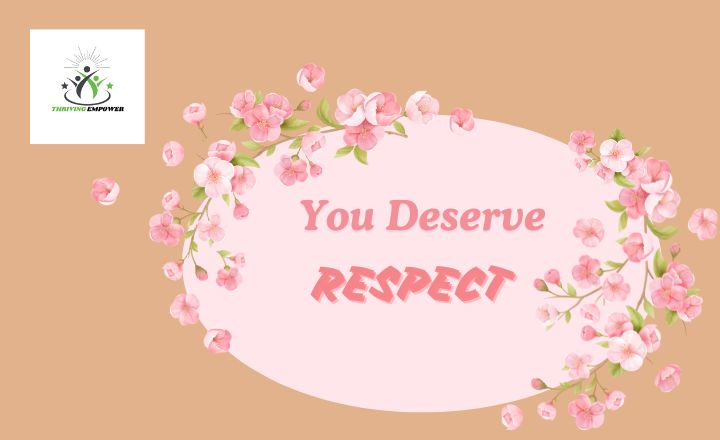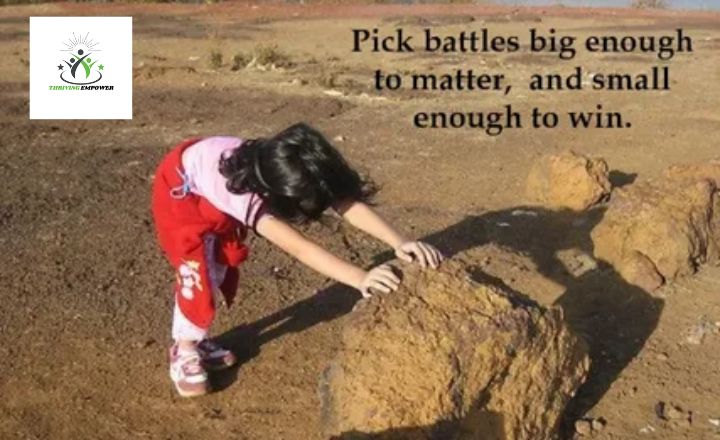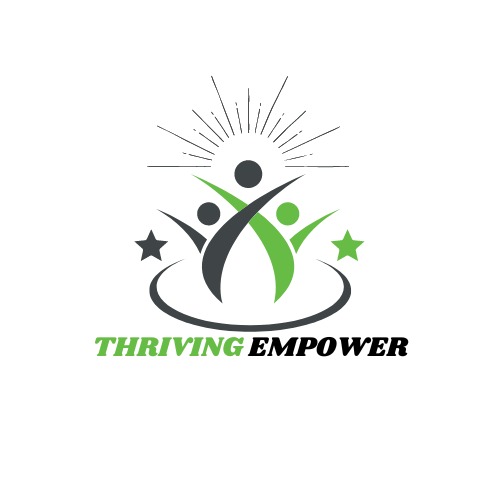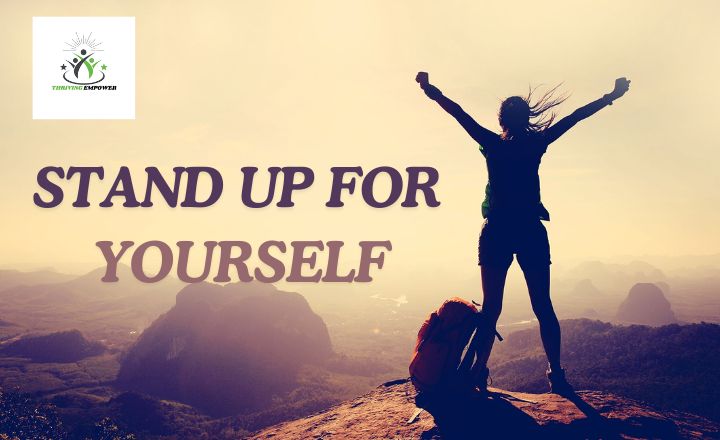Standing up for yourself is not just an option but a necessity in today’s world. The consequences of standing up for yourself can be both liberating and challenging, as you cross through potential hostility, judgments, and backlash.
It’s all too easy to fall into the trap of letting people take advantage of your kindness, leaving you feeling drained and unappreciated. It’s time to take a stand for yourself and reclaim your sense of empowerment.
By choosing to stand up for yourself, you are choosing self-respect, setting boundaries, and paving the way for an empowered life.
How to stand up for yourself
Some of the reasons why it may be difficult to stand up for your rights and 7 ways you can make a start with standing up for yourself.
- Standing Up For Yourself By Getting Clear on Your Boundaries
- Remind Yourself You Deserve Respect
- Get Clear on the Situation
- Pick Your Battles
- By Saying “No” More
- Watch Your Body Language
- Take Small Steps
Stand Up For Yourself By Getting Clear on Your Boundaries

Boundaries are the distance at which I can love you and me simultaneously. It’s hard to stand up for your rights if you do not know what your boundaries are, be kind to yourself. When you get clear on your boundaries, you communicate your needs effectively, look after for healthy relationships with others.
Start by asking yourself these questions: What frustrates me? What causes me stress? Who makes me anxious? What things do I regret doing? These inquiries delve into the core of your boundaries, helping you identify where they might be blurred or lacking.
As author Bryant McGill once said, It is not your job to make everyone happy. “It is your job to stand up for yourself.”
Remind Yourself You Deserve Respect
It’s time to remind yourself that you deserve respect. When you fail to uphold your worth, you allow others to treat you poorly and extend a cycle of disrespect. It’s crucial to set boundaries and claim your value in all aspects of life.
Your dignity and value should never be compromised for the sake of others’ comfort or approval. When you lack self-respect and struggle with self-worth, it can be difficult to demand respect from others.

Standing up for yourself sends a powerful message about your self-worth and shows others how you expect to be treated. You are no less important than anyone else, and your voice deserves to be heard.
It’s essential to remind yourself daily that you deserve respect in all aspects of your life, whether it be in relationships, at work, or within yourself.
Get Clear on the Situation
Be 100% sure that the situation truly requires you to take a stand. Sometimes, your past experiences or insecurities can threat your judgment when deciding whether or not to stand up for your champions.
Being aware of your triggers and understanding the emotional impact of the circumstances can help you navigate the decision-making process effectively. Take a moment to reflect on your motivations and intentions before taking action.
By recognizing these triggers and their underlying emotions, you can approach the situation with a clearer mind and a more composed attitude. By gaining clarity on the situation, you empower yourself to respond thoughtfully rather than react emotionally.
Sticking up for yourself is not just about asserting boundaries but also about affirming your self-worth and value in any given circumstance.
Pick Your Battles
In choosing which battles to fight, it’s crucial to weigh the possible consequences of standing up for yourself. Sometimes, it’s more beneficial to let go of minor issues in order to maintain harmony and focus on what truly matters.
In life, you are constantly faced with choices on when to stand your ground and when to let things slide. Pick your battles wisely, for every contest may not be worth the energy and stress it brings.

Holding the line in the sand doesn’t always mean being aggressive or confrontational; sometimes, true strength lies in knowing when to walk away and save your energy for battles that truly align with your values and priorities.
Remember, picking your battles doesn’t mean avoiding confrontation altogether, it means being strategic and intentional about where you invest your energy and efforts.
Stand Up For Yourself By Saying “No” More
It’s time to break free from the cycle of saying yes all the time and people-pleasing. By continuously agreeing to things that don’t align with your values or desires, you risk sacrificing your well-being and authenticity.
The fear of saying no often stems from a discomfort in setting boundaries or a desire to avoid conflict. However, by asserting yourself and standing up for what you truly want, you pave the way for more fulfilling relationships and experiences.
When you prioritize others’ needs over our own by constantly saying yes, you not only compromise your boundaries but also overlook opportunities for personal growth. You can motivate yourself by following standing up for yourself quotes.

Empowering yourself starts with setting boundaries, and one of the most powerful words you can use is no. Setting boundaries isn’t about creating distance but rather building stronger connections based on mutual understanding and authenticity.
When it comes to standing up for yourself, the power of saying no cannot be underestimated. You can motivate yourself by following standing up for yourself quotes.
Watch Your Body Language
Your body language can speak volumes before you even utter a word. Standing up straight, making eye contact, and facing the person you are interacting with shows confidence and engagement.
When you slouch, glance away, or turn your body away from someone during a conversation, it can signal disinterest or lack of respect.
Watch yourself closely in various social settings to ensure that your body language aligns with the message you want to convey. To show you mean business with your body, focus on open gestures that signal approachability and engagement.
Keep your posture straight and shoulders back to exude confidence in any situation. By consciously adjusting your posture and eye contact, you can convey openness and attentiveness during conversations.
Take Small Steps
Take small steps in speaking up and saying something a little bit each day. Once you start winning smaller battles, you can move up to tackling bigger challenges with ease. These small victories pave the way for larger accomplishments in the future.
By challenging yourself with small actions outside your comfort zone, you are gradually building resilience and confidence. In times of doubt or adversity, it’s crucial to love yourself and believe in your abilities. You can build confidence by following stand up for yourself quotes.
Conclusion
Standing up for yourself is a way to take control of your life and assert your boundaries. Using the word no more often can help you set clear limits and communicate your needs effectively. Utilizing strong body language can reinforce the message you convey through words. So, stand tall, speak confidently, and take charge of your own statement.
You may also like 5 habits that are killing your confidence.
FAQs
What does Stand Up for Yourself mean?
Standing up for yourself means asserting your rights and expressing your needs and opinions confidently, without aggression. It involves setting boundaries and advocating for yourself in various situations.
Why is it important to stand up for myself?
Standing up for yourself is crucial for personal empowerment, self-respect, and mental well-being. It helps build confidence, fosters healthy relationships, and ensures that your voice is heard.
How can I start standing up for myself?
Start by identifying your values and boundaries. Practice assertive communication techniques such as using I statements, maintaining eye contact, and staying calm when expressing your thoughts.
Can standing up for myself affect my relationships?
Yes, it can strengthen them! While some people may initially resist changes in dynamics, clear communication often leads to healthier interactions based on mutual respect.
Is it possible to stand up for myself without being rude or aggressive?
Absolutely! Assertiveness is about respectful communication. You can express your needs firmly yet kindly it’s all about the tone and approach you use.
How do I know if I’m being too passive or too aggressive?
If you’re frequently feeling unheard or taken advantage of (passive) or if others consistently react negatively to how you express yourself (aggressive), it’s a sign you might need to find a balance between the two.

